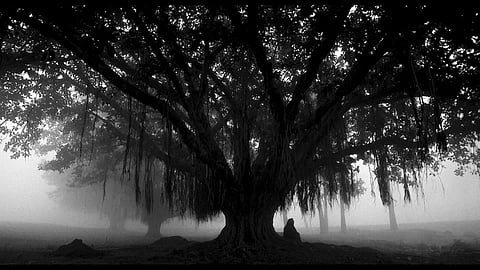
- LIFESTYLE
- FASHION
- FOOD
- ENTERTAINMENT
- EVENTS
- CULTURE
- VIDEOS
- WEB STORIES
- GALLERIES
- GADGETS
- CAR & BIKE
- SOCIETY
- TRAVEL
- NORTH EAST
- INDULGE CONNECT

After winning accolades internationally, Abhilash Sharma’s Magahi language film Swaha (Eng title- In The Name of Fire) to have its India Premiere at the prestigious International Film Festival of Kerala (IFFK) 2024 in the ‘Indian Cinema Now’ section.
The film had its World Premiere at the 2024 Shanghai International Film Festival, China in the Asian New Talent Competition Section where it won two Golden Goblet Awards for Best Director (Abhilash Sharma) and Best Actor (Satya Ranjan).
The Black and White drama starring Sonalli Sharmisstha and Satya Ranjan in lead roles tells the heart-wrenching story of a determined mother abandoned by her husband on a quest for a meagre living and how she fights societal challenges to feed her child. Struggling with despair, she confronts the chilling belief that her husband's return demands a sacrifice—her most cherished essence, entangled with mystical whispers.
Sharma's In the Name of Fire is set in the rural east Indian state of Bihar and focuses on a struggling mother and child and how their caste impacts their existence.
Abhilash Sharma, the writer and director of Swaha, shares his joy: “For me, its selection at the 29th IFFK is incredibly fulfilling, as I've always felt a deep cultural and aesthetic connection to this festival. From Shanghai to Kerala, it's a circle of people showing love for our work.
"The inspiration for Swaha ignited while I was captivated by Alan Becker's short animation, Animator vs. Animation. This exploration of the dynamic between creator and creation evolved into a narrative focused on a struggling mother and her child. The film examines fundamentalist elements in our society, illustrating how the intersections of religion and caste lead to economic disparities that foster division and animosity. My personal connection to Buddhist principles has greatly shaped this storytelling, allowing for a richer exploration of suffering, compassion, and the path toward enlightenment," he says.
Abhilash goes on saying, "The title Swaha is rooted in a Hindu ritual signifying an offering to the fire god, symbolising the fulfilment of desires and wishes. In our film, the protagonist's journey reflects this concept; her ultimate act of self-sacrifice is not just a personal offering but a profound gesture intended to spark transformation within her community.
"Swaha also immerses viewers in the world of Magahi, an ancient language with origins tracing back around 2,500 years to the Buddhist era in central Bihar. Written in the Kathi script, Magahi is an endangered language facing significant social and economic challenges. By spotlighting this underrepresented language and its folk songs vital expressions of cultural heritage, we aim to honour the community's collective wisdom," he concludes.